Tinnitus is a common medical condition that affects millions of people worldwide. It is marked by a continuous ringing, buzzing, or humming in the ears. While it typically does not cause any physical pain, tinnitus can be incredibly distracting and interfere with daily life. Thankfully, veterans with tinnitus may be eligible for disability benefits if their condition is service-connected. In this article, we’ll discuss how the VA rates tinnitus for disability and what veterans need to know about filing a claim. Read on to learn more about the VA disability rating for tinnitus.
What is Tinnitus
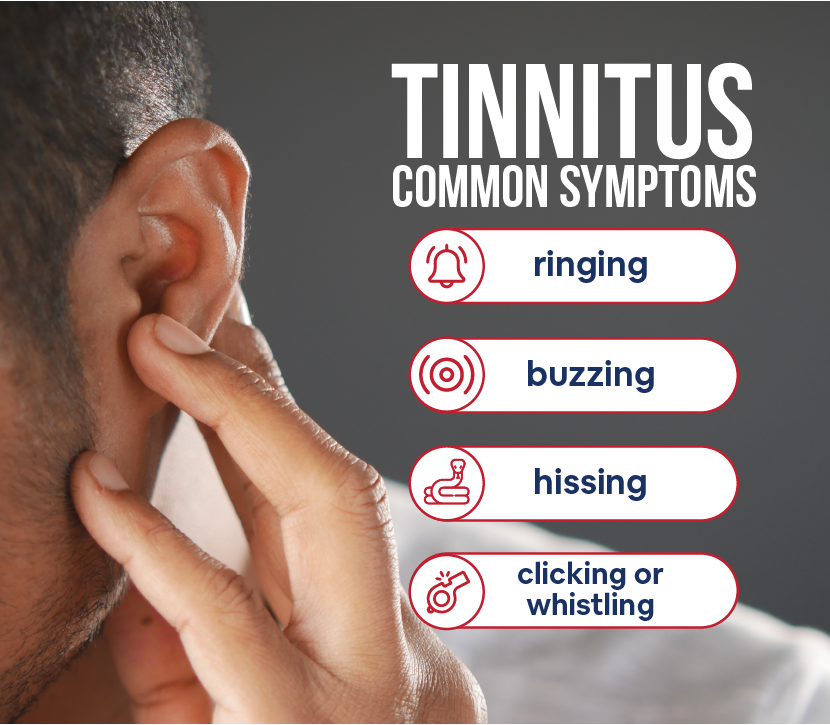
Tinnitus can have many causes and affects millions of people worldwide. It is characterized by persistent ringing or buzzing in one or both ears. This can range from an occasional annoyance to a constant, debilitating distraction. While there is no cure for tinnitus, treatments are available which can help manage the symptoms and make a living with it easier. Symptoms of tinnitus can vary from person to person and include:
- Ringing
- Buzzing
- Hissing
- Clicking or whistling
These sounds can be intermittent, continuous, or pulsating in nature. They may be heard in one ear only or both ears. The volume of the sound can also range from very quiet to very loud.
Causes of Tinnitus
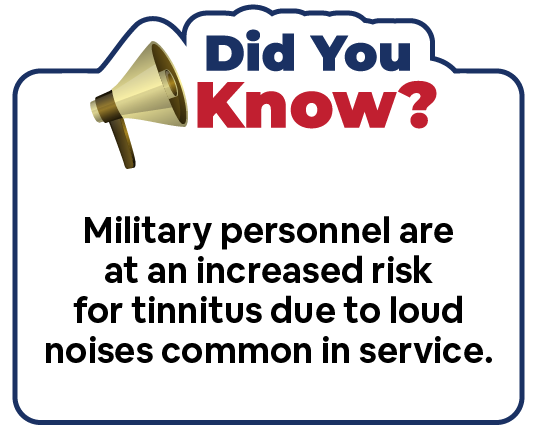
Tinnitus can be an incredibly frustrating and difficult condition to live with. Those affected by tinnitus need to understand the causes of their symptoms and seek treatment if necessary. Proper diagnosis and management make it possible to manage tinnitus and reduce its negative impact on quality of life.
Military personnel, in particular, are at an increased risk of experiencing tinnitus due to the loud noises common in service. However, tinnitus can be caused by various factors, including ear infections, head and neck injuries, medications such as nonsteroidal anti-inflammatory drugs or diuretics, chronic health conditions, and structural abnormalities in the ear.
Types of Tinnitus
Tinnitus is split into two categories:
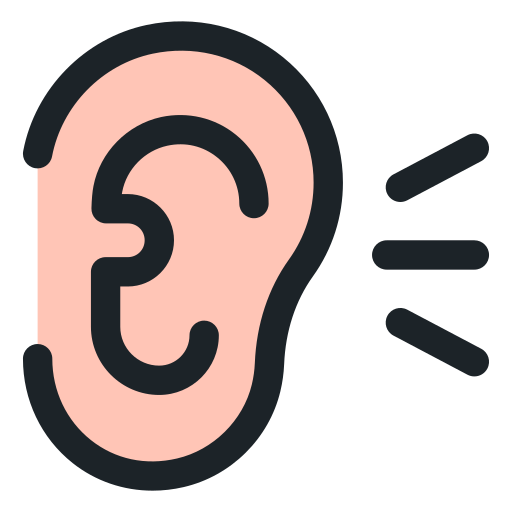
1. Subjective tinnitus
Subjective tinnitus is the most common and is defined as a sound only heard by the patient. An auditory or neurological reaction to hearing loss generally causes it.

2. Objective tinnitus
Objective tinnitus, however, happens when noise is generated around the ear and can be heard by both patient and examiner alike. This type of tinnitus is relatively rare, with only 1% of reported cases fitting this description.
The High Prevalence of Tinnitus in Veterans

Tinnitus is a common condition in veterans, particularly those on active duty. The loud and persistent noise characteristic of the military environment can take its toll on hearing, leading to tinnitus symptoms such as ringing or buzzing in one or both ears. Tinnitus can be more pronounced when it’s quieter at night, making it difficult for veterans to get a good night’s sleep.
The effects of long-term exposure to loud noises can have a serious impact on veterans’ mental health conditions, leading to fatigue, anxiety, and irritation. Men over 65 are particularly susceptible to tinnitus, but it can affect veterans of any age.
How the VA Rates Tinnitus
Tinnitus is a common service-connected disability among veterans, and the VA considers this when evaluating claims. The VA rates tinnitus under 38 CFR § 4.87, Schedule of Ratings – Ear, Diagnostic Code 6260. Tinnitus VA ratings are a flat 10 percent disability rating for both ears, no matter how severe the symptoms may be. It would be impossible to attain a higher rating than 10% for tinnitus. It is important to provide as much evidence as possible showing how tinnitus affects your daily life.
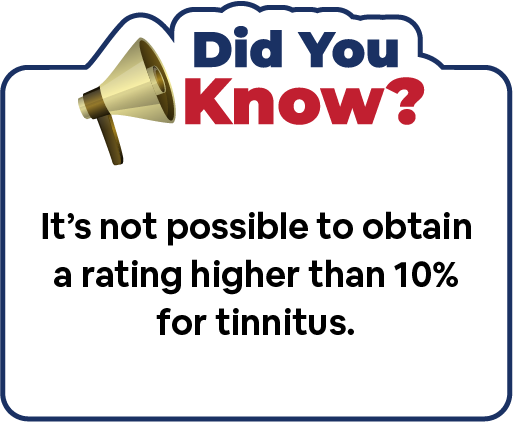
Proposed Change to Tinnitus Rating
The VA is considering revisions to the ratings for tinnitus claims that could significantly change how veterans receive service-connected compensation for this condition. The proposed changes would mean that veterans would no longer be able to file a service-connection claim and potentially receive up to a 10% disability rating solely due to having tinnitus. Instead, the tinnitus would only be acknowledged as a symptom of an underlying condition, and then service-connected compensation for tinnitus would be awarded as part of that illness.
Although most VA claims are assessed based on the seriousness and severity of the disability, regular or recurrent tinnitus carries a maximum rating of 10%, regardless of how bad it is or whether it is present in one or both ears. This can result in a lower disability rating than veterans may deserve.
Establishing Service Connection for Tinnitus
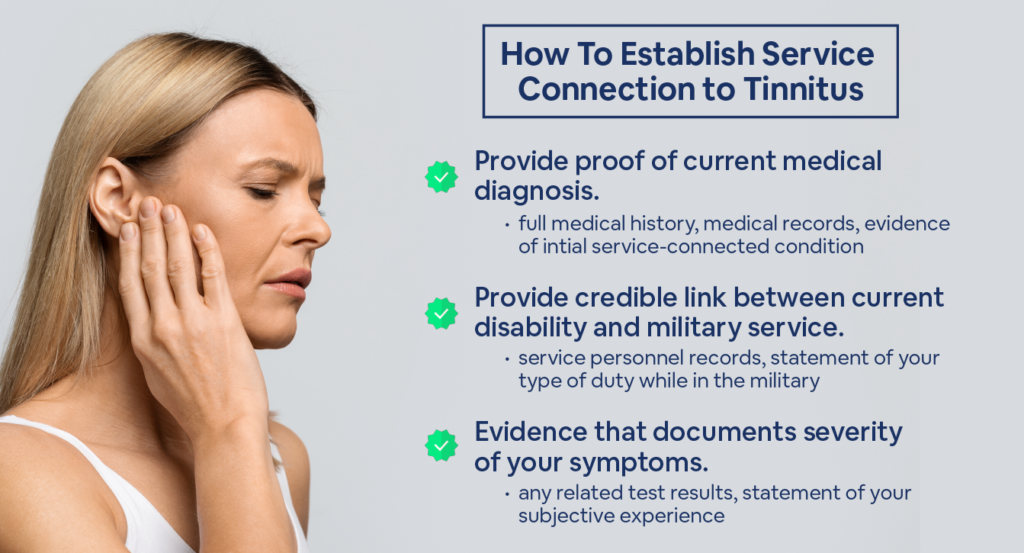
When filing for VA disability benefits related to tinnitus, it is important to demonstrate a service connection. This means providing evidence that tinnitus is caused by a medical condition or injury suffered during military service. To successfully establish a service connection, you must provide proof of a current medical diagnosis and a credible link between the current disability and your military service.
Evidence such as medical records, service personnel records, a statement of what type of duty you had while in the military, and other documents must be compiled to support the claim. Suppose your tinnitus is related to a traumatic brain injury (TBI), hearing loss, or another condition already rated by the VA. In that case, it is important to include evidence of the initial service-connected condition in your tinnitus claim.
In addition, you must also provide evidence that documents the severity of your tinnitus symptoms. This includes a full medical history, any test results related to hearing loss and tinnitus, an audiological evaluation or hearing test result, a statement of your subjective experience with tinnitus, and any other evidence supporting your severity condition.
Secondary Conditions Related to Tinnitus

Migraine Headache Conditions Secondary to Tinnitus
Veterans suffering from tinnitus may experience secondary conditions such as migraine headaches. Migraine headaches are characterized by intense pain, nausea, vomiting, sensitivity to light and sounds, lightheadedness, and blurred vision. This can occur due to sensory stimulation from their tinnitus symptoms. In some cases, the intensity of their tinnitus may trigger a migraine attack. It is important to note that migraines can be debilitating and last from hours to days, depending on the person.

Depression Secondary to Tinnitus
Veterans suffering from tinnitus may also experience depression as one of the secondary conditions related to their tinnitus. Depression is a serious mental health condition that affects how an individual thinks, feels, and acts. Common symptoms of depression can include persistent sadness, worthlessness, and hopelessness; lack of motivation or interest in activities; difficulty sleeping and concentrating; changes in appetite resulting in weight loss or gain; irritability; and fatigue. It is important that veterans who are experiencing depression due to their tinnitus reach out and seek help from a mental health professional.

Anxiety Secondary to Tinnitus
Veterans suffering from tinnitus may also experience anxiety as a secondary condition. Anxiety is a psychological disorder that can cause intense fear, worry, and uneasiness. Common anxiety symptoms include increased heart rate, difficulty breathing, sweating, trembling or shaking, feeling overwhelmed by stress, and avoidance of certain situations due to fear. It is important to note that anxiety can be debilitating and should not be taken lightly. If you or a loved one suffer from severe anxiety due to tinnitus, please seek help from a qualified mental health professional.

Sleep Apnea Secondary to Tinnitus
Veterans suffering from tinnitus may also experience the secondary condition of sleep apnea. Sleep apnea is a serious medical disorder that can cause an individual to stop breathing for short periods during sleep. Common sleep apnea symptoms include snoring, difficulty falling and staying asleep, excessive daytime sleepiness, fatigue, and morning headaches.
Need Help Filing a Claim for Tinnitus
If you or a loved one are a veteran experiencing tinnitus due to military service, you may qualify for VA disability benefits. The best way to ensure your tinnitus VA claim is filed correctly is to seek help from experienced claim coaches who can guide you through the process. At Vet Claim Solutions, our team of experienced claim coaches understands the complexities of VA disability claims and can help you navigate the system to get the benefits you deserve. Contact us today for a free-no obligation strategy call. We are here to help!
FAQ’s
1. What is the maximum VA rating for tinnitus?
The maximum VA (Department of Veterans Affairs) rating for tinnitus is 10%. Tinnitus is generally rated as a single condition and does not have ratings above 10%, regardless of severity.
2. Is tinnitus 10% VA disability?
Yes, tinnitus can be rated as a 10% VA disability if it is considered service-connected and meets the criteria for a compensable disability under the VA’s rating schedule.
3. What are the VA conditions secondary to tinnitus?
Several VA conditions can be claimed as secondary to tinnitus if they are directly caused or aggravated by tinnitus. These may include sleep disturbances, anxiety, depression, and hearing loss.
4. How do you prove tinnitus?
To prove tinnitus for a VA disability claim, veterans typically need to provide medical evidence, such as medical records or statements from qualified healthcare providers, that show a diagnosis of tinnitus and a connection between the tinnitus and their military service or another eligible event.
5. Can tinnitus be denied VA disability?
Yes, tinnitus can be denied as a VA disability if the VA determines insufficient evidence to establish a service connection or if they find that it does not meet the criteria for a compensable disability under the VA’s rating schedule. It’s important to provide thorough and relevant medical evidence to support your claim when applying for VA disability benefits for tinnitus or any other condition.

